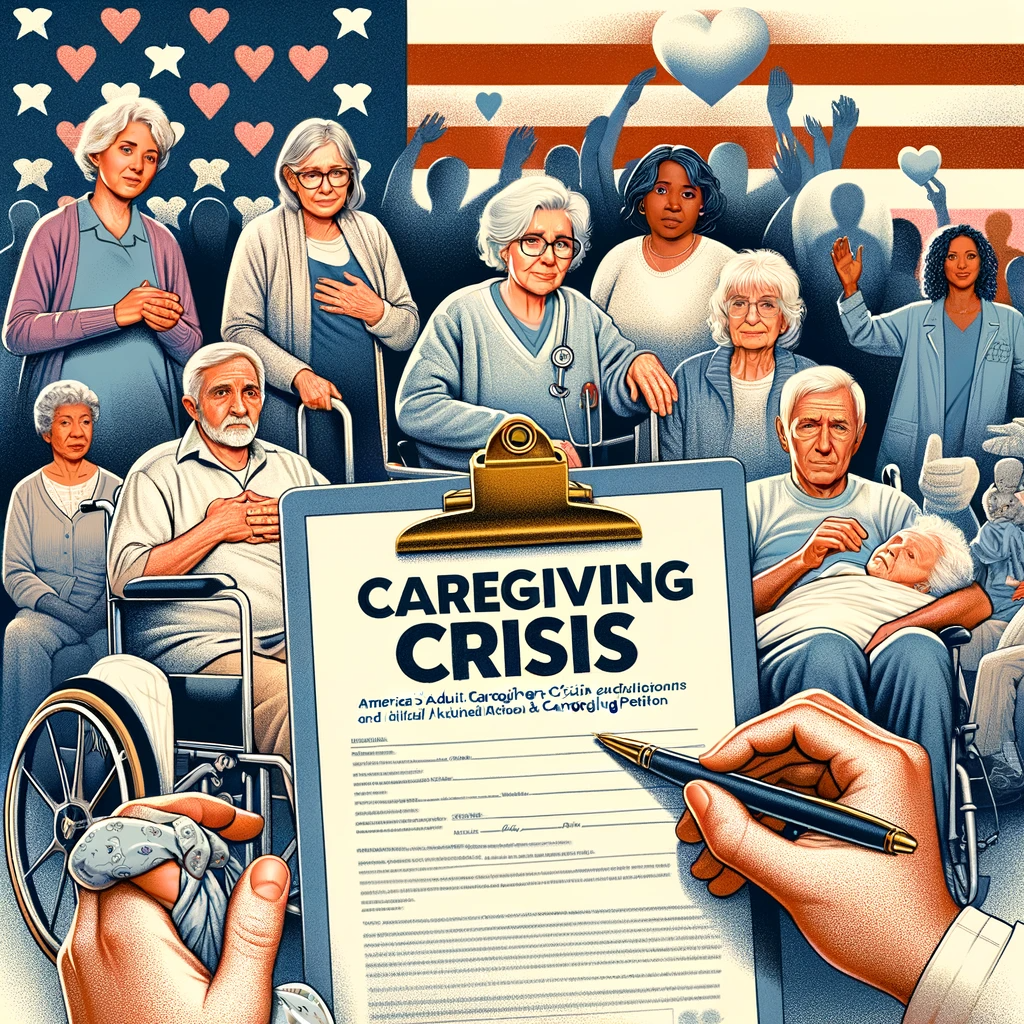Compassionate Caregiving: A Guide to Caring for Yourself While Tending to Your Family
Explore the delicate balance of caregiving in 'Compassionate Caregiving: A Guide to Caring for Yourself While Tending to Your Family.' This insightful article delves into the challenges and rewards of caregiving, emphasizing the crucial role of self-care for caregivers.

Caring Defined: The Essence of Caregiving
At its core, caregiving embodies the act of providing care and assistance to another individual's health and well-being. It's a multifaceted endeavor that encompasses physical support, emotional nurturing, and often financial management. Caring is not merely a set of tasks; it's a deep-seated emotional commitment to the welfare of another. It's about 'caring about me' as much as 'caring about you,' ensuring that the caregiver's health and happiness are preserved alongside that of the care recipient.
I want to share a few statistics that caregivers should know. Because so many are on the internet, I thought I would show you based on monthly searches.
This essential act of 'caring' resonates with the statistics that highlight its prevalence: 135,000 searches indicate a widespread recognition of its societal importance. Meaning, we all have good intentions and want to help others. The term 'care caring' echoes through 1,000 queries, demonstrating that to care for someone involves a constant, dynamic interaction of giving and receiving. When one delves into 'caring about me,' with 720 searches, it becomes evident that self-care is an integral part of the caregiving process, often overlooked but essential to sustain the care provided to others. I bring this point up, because family caregivers rarely take care of themselves. Which is why the statistics are so grim. Sixty three percent of family caregivers become seriously ill or die before the person they are providing for dies. The chronic stress and burden of caregiving negatively impacts every family caregiver.
Caregiving Importance: The Impact of Compassionate Support
Caregiving is a role that touches millions, with a search volume of 320 for 'caring self' indicating a growing awareness of its significance. It is the invisible scaffolding that supports the fabric of society. The 'caregivers guide,' a term searched 90 times, is a testament to the need for comprehensive information and support for caregivers who navigate this complex role. This guide is more than a manual; it's a beacon for the 53.8 million Americans who provide unpaid care, offering advice, solace, and practical strategies for a journey often embarked upon suddenly and without preparation.

Common Caregiving Problems: The Challenges Caregivers Face
However, with the role of caregiving comes a spectrum of challenges. Mental health concerns such as depression, anxiety, and stress are prevalent amongst caregivers, often leading to high rates of negative affect including guilt, sadness, and worry. A search for 'caring hands' might reveal the physical manifestation of these emotional burdens, as caregivers grapple with fatigue, sleep problems, and weakened immune systems, indicated by 320 searches for 'guide care.' The term 'take care of yourself and your family,' with 30 searches, is a poignant reminder of the delicate balance caregivers must maintain.
Physical health concerns are just as pressing. Caregivers experience lower self-rated physical health compared to others of the same age and sex, with adverse changes in health status that can be profound. Their predicament is further compounded by functional and cognitive impairments, as they navigate the intricacies of instrumental activities of daily living (IADL), especially among dementia caregivers.
As if the personal toll wasn't enough, secondary strains manifest in work disruptions, financial strains, and relationship stress, effectively altering the caregiver's entire life landscape. Reduced quality of life is a significant risk, as caregivers find themselves losing precious time for self-care, which includes sleep, diet, and exercise.
The introduction to caregiving reveals a stark dichotomy: while caregiving is an act of profound human kindness, it is also a role fraught with deep challenges. It's a journey that requires a map—a caregivers guide—to navigate successfully. This underscores the importance of addressing the 'caring self' aspect, advocating for resources, and a support system that allows caregivers to effectively 'take care of themselves and their families.
The State of Caregiving Today: A Statistical and Personal Perspective
In today's world, the act of caregiving has emerged as a silent pillar supporting the healthcare system. With over 55 million family caregivers in the United States, the significance of this role cannot be overstated. These caregivers provide an estimated 34 billion hours of care annually—an astonishing economic value that, in 2023, was appraised at $650 billion, surpassing the total sales of some of the largest tech companies.
Yet, beyond the staggering statistics, lies the personal cost of caregiving—a cost that isn't as easily quantified. The keyword 'caring about me' reflects an 8 out of 10 search interest score, indicating that individuals are increasingly aware of the emotional and physical toll caregiving can exact. Caregivers commonly report feelings of depression and anxiety, alongside subclinical levels of stress that may not be immediately apparent but are equally damaging. The high rates of negative emotions such as guilt, sadness, dread, and worry underscore the emotional labor inherent in caregiving.

The Emotional and Physical Challenges of Caregiving
This emotional burden is coupled with a physical one. Caregivers frequently experience fatigue, disrupted sleep patterns, and a weakened immune system, making them more susceptible to illness. The physical demands of caregiving can lead to adverse changes in health status, with caregivers often noting a lower self-rated physical health compared to peers of the same age and sex. This decline is not only a result of the demanding nature of caregiving but also due to the caregiver's tendency to prioritize the health of the care recipient over their own, often neglecting their well-being.
Recognizing the multifaceted challenges caregivers face, the 'caregivers guide' with a search interest score of 8 out of 10, becomes an essential tool. It's more than a manual—it's a compass for navigating the complexities of caring responsibilities while maintaining one's health and personal life. A caregivers guide addresses topics such as balancing work and caregiving, managing the financial strains that come with unpaid care, and finding time for self-care—which is often the first to be neglected in the face of caregiving duties. The Caregiver Relief caregivers guide is offered in the New to Caregiving course. The advanced course, we offer How to Become a Patient Care Advocate for your family members.
We offer strategies for maintaining mental and physical health, such as establishing routines, seeking support from community services, and practicing self-compassion. We emphasize the importance of caregivers taking care of themselves. We encourage 'take care of yourself and your family' by encouraging the building of a Care Team Partner support group. This advice is not just about maintaining health but also about preserving the caregiver's ability to provide care long-term.
In essence, the state of caregiving today is one of paradoxical contrasts—where the immeasurable value of care given is met with the need for caregivers to receive support. It's a reminder that 'caring' extends beyond the act itself to include caring for the caregiver, ensuring they have the resources, support, and guidance to sustain themselves and those they care for. Our caregivers' guide are self directed courses. Our support for the family caregiver becomes not just a resource but a beacon of hope and resilience for those navigating the oft-turbulent seas of caregiving.
Challenges in Caregiving: Navigating the Complexities of Compassionate Support
Caregiving, while a labor of love, presents a multitude of challenges that can impact a caregiver's well-being in profound ways. These challenges can be broadly categorized into mental and physical health concerns, functional and cognitive impairments, and secondary strains that extend into various aspects of life.

Mental Health Concerns
The mental health of caregivers is often compromised due to the intense emotional involvement and constant vigilance required in caring for a loved one. Depression is a common ailment among caregivers. Anxiety, another significant concern, stems from the continuous worry about the care recipient's health and the caregiving duties' unpredictability.
What is Subclinical Stress?
Subclinical stress is another silent adversary. It may not always be evident, but its effects are pernicious, leading to high rates of negative affect. Caregivers often report feelings of guilt, sadness, dread, and worry, which can compound over time. Ambivalence about the caregiving role and witnessing the suffering of relatives contribute to a complex emotional landscape that caregivers must navigate, often leading to anticipatory grief as they brace for the potential loss of their loved ones.
Physical Health Concerns
On the physical front, caregivers face a host of challenges. Fatigue is a constant companion due to the demanding nature of caregiving tasks and the emotional toll it takes. Sleep problems are prevalent, with caregivers struggling to find restful sleep amidst their responsibilities and concerns. This lack of sleep can lead to a weakened immune system, making caregivers more susceptible to illnesses, which is especially detrimental given their caregiving duties.
These physical health concerns are often exacerbated by the caregivers' tendency to neglect their health. The search term 'guide care' with 320 queries signifies the quest for resources that can help manage these physical demands.
Functional and Cognitive Impairment
Caregivers themselves may face functional and cognitive impairments due to the stress and demands of caregiving. The need for help with instrumental activities of daily living (IADL) can increase, especially among those caring for individuals with dementia. Caregivers may experience difficulty with memory and concentration, impacting their ability to perform caregiving tasks effectively and manage their affairs.

Secondary Strains
Secondary strains further complicate the caregiving role. Financial stress is significant, as caregivers often have to contend with lost income due to reduced work hours and the high costs associated with care. Employment strain includes juggling job responsibilities with caregiving duties, leading to family-to-work spillover and work-to-family spillover.
Relationship stress is also a common challenge as caregiving can strain the dynamics within a family, leading to conflicts and interpersonal issues. Caregivers may feel isolated or abandoned by others, exacerbating feelings of stress and emotional burden. The keyword 'take care of yourself and your family' with 30 searches reflects the balancing act caregivers must perform, often sacrificing their needs for the care recipient.
In summary, the challenges faced by caregivers are as diverse as they are demanding. Addressing these challenges requires a multifaceted approach that includes support systems, access to health care, and societal recognition of the critical role caregivers play. It's about redefining 'caring' to include not only the act of providing care but also ensuring the caregiver's health and resilience.
Navigating the Gap: Resource and Service Limitations in Caregiving
Caregivers across the nation face a pressing issue that often goes unnoticed by the broader healthcare system: the dire need for affordable respite care. This need is underscored by the keyword 'care caring,' which has been searched 1,000 times, reflecting the urgency for support in the caregiving community. Respite care provides temporary relief for primary caregivers, but its lack of accessibility and high costs mean that many are left doing it alone. The solitude of caregiving is not simply a matter of circumstance but often the result of a system that lacks the necessary infrastructure to support these vital community members.

The role of the direct care worker for family caregiver
The role of direct care workers is indispensable in alleviating the pressures faced by family caregivers. However, there's an alarming shortage of these professionals. With a projected need for an additional 8.2 million direct care jobs to be filled by 2028, the current workforce is inadequate. This shortage places an unsustainable burden on family caregivers, many of whom are already stretched thin balancing work, personal health, and caregiving duties.
Statistics paint a stark picture of the impact of direct care worker shortages. Caregivers find themselves compensating for this gap by providing more hours of care, often without any professional support. This not only increases their workload but also the risk of burnout and health issues. The term 'caring self,' searched 320 times, highlights the dichotomy faced by caregivers: while they are focused on the care of others, their self-care remains a low priority, exacerbated by the lack of professional support.
The Financial Implications of Caregiving
The financial implications of caregiving cannot be overstated. The rising costs of care, including high copays and out-of-pocket expenses, place a significant strain on families. For many, the term 'guide care,' with a search volume of 320, becomes a quest for financial guidance in addition to caregiving advice. The cost-sharing aspect of healthcare, where families are expected to pay, for example, $250 a day for skilled care for rehabilitation, presents a considerable challenge. Such expenses can deplete savings rapidly, leaving caregivers facing economic hardships that previous generations of caregivers did not encounter.

High copays for therapies such as physical therapy (PT), occupational therapy (OT), and speech therapy further complicate the financial landscape for caregivers. These therapies are often essential for the care recipient's recovery and quality of life, yet the cost can be prohibitive. The strain of these expenses is not just financial but emotional, as caregivers are forced to make difficult decisions about the care they can afford versus the care their loved ones need.
In conclusion, the limitations of resources and services available to caregivers are significant and multifaceted. From the need for more affordable respite care to the shortage of direct care workers and the rising costs of healthcare, caregivers are confronted with a system that often seems indifferent to their needs. Addressing these challenges requires a concerted effort from policymakers, healthcare providers, and the community to ensure that caregivers receive the support they desperately need.
Advocacy and Support Systems: Championing the Cause of Caregivers
Advocacy plays a pivotal role in transforming the care systems that support some of the most vulnerable members of our society—the caregivers. Through advocacy, caregivers, healthcare professionals, and community members come together to voice the pressing needs of caregivers and direct care workers, catalyzing systemic change.
The Caregiver Relief Family Caregiver and Direct Care Worker petition is a clarion call to action. It is a movement geared towards enacting policies that recognize the invaluable work of caregivers and ensure they are supported both legally and financially. Encouragement to support this petition is not merely about signing a document; it's about affirming one's commitment to the wellbeing of those who dedicate their lives to the act of caring.
Advocacy efforts, provide a structured approach to navigating the complex healthcare landscape, empowering caregivers with the knowledge to demand better services and support.We at Caregiver Relief promote advocacy. Out goals to engage with policymakers, collaborate with advocacy groups, and utilize media channels to raise awareness about the challenges caregivers face. I hope you will sign and share our petition with others.

Our advocacy role promotes reforms to include increasing funding for respite care services, ensuring fair compensation for direct care workers, as well as provide financial compensation for the family caregiver, not just tax credits. We encourage reducing the financial burden on families through policy change.
In the context of advocacy, our efforts serve as a reminder that while they are individuals caring for others, there's a community ready to advocate for their right to receive care, support, and recognition. It's a call to caregivers to join the advocacy efforts, to share their stories, and to contribute to a collective voice that demands change.
Support systems form the backbone of effective caregiving, and through advocacy, these systems can be strengthened and expanded. By supporting petitions and advocacy initiatives, individuals can contribute to a future where caregivers receive the recognition they deserve, and where care systems are designed to support not just the recipients of care, but those who provide it.
Policy Recommendations and Proposed Resolution for Caregiving Support
In the face of an aging population and a healthcare system that is increasingly under pressure, comprehensive policy recommendations are essential to support both family caregivers and direct care workers. The following detailed recommendations address the urgency of implementing supportive measures:
Financial Compensation for Caregivers: Don't offer tax credits and subsidies for family caregivers. Recognizing the economic value of the care they provide is a necessity.Financial support for caregivers is a priority. Family caregivers are unable to save for their own retirement years. They provide care at great physical and financial detriment.
Professional Training and Education: Develop and fund programs to enhance the skills of direct care workers.This should include a career ladder with certifications. Each certification increases the salary. At the present time, there ia no way for career advancement.
The family caregivers are now expected to provide care and tasks once preformed by licensed professional nurses. Caregivers are now providing wound care, hooking up IV's for home IV therapy and the list goes on. Organizations need to find a way to educate and support the family caregivers as they preform tasks they are ill prepared to handle.
Standardization of Care Worker Roles: Create clear, standardized job roles and responsibilities for direct care workers to professionalize the field and ensure consistency in care quality.
Wage Reforms: Mandate a living wage for direct care workers to address the poverty levels amoerty level ng these essential workers. Many live at or below poverty. Most have more than one job. This highlights the need for economic stability.

Respite Care Funding: Increase federal and state funding for respite care programs to alleviate the burden on family caregivers. Caregivers need and deserve regular and ingoing respite care. The need for personal time and relief from caregiving duties is necessary for the family caregiver to regroup and renew. Respite care allows the family caregiver to be able to continue to provide the best possible care.
Comprehensive Insurance Coverage: Reform insurance policies to cover more caregiving services, including long-term care, which can be prohibitively expensive. The Medicare Advantage programs have a cost sharing formula that most consumers are unaware of. For example, a senior on a fixed income is expected to have a copay for each therapy session. That copay can break the bank for a person a a fixed income. The other shocking copays are the cost sharing of skilled care units. Every senior will need to be admitted to a skilled unit.
Imagine you have had a fall. You are in the hospital, have surgery on your hip and your wrist. The doctors recommend your loved one to go to a skilled unit for rehabilitation. At the present time, your family member needs 24 hr/ 7 day a week care. Now, imagine being told that you will be expected to pay $250 a day, yes a day, as your copay. Then you learn that the yearly out of pocket will be $7500.
This is devastating news. Families are shocked and left to find other ways to get the care their family member needs. Many are having to use savings. Some families are pitching in financially. If you think this is not going to happen to you, think again. This is happening everyday in the US right now.
Workplace Protection Laws: Enact laws that protect the employment of caregivers, allowing for flexible work arrangements and protected leave periods without the risk of job loss.
Community-Based Caregiving Infrastructure: We encourage the development of a national movement to introduce a care team partner support group. With the growing aging population and limited amount of youth to provide that care, a national movement to encourage a sense of volunteerism. A public education program that encourages community members to provide practical support to the care recipient and their primary caregiver. Invest in community-based caregiving initiatives that offer local support and resources, making care more accessible and reducing institutionalization.

Technology Integration: Encourage the use of technology in caregiving, such as telemedicine and health monitoring apps, to enhance the efficiency and reach of care services.
Increased Funding for Research: Allocate resources for research into caregiving strategies and the development of innovative care models.
Proposed Resolution
The proposed resolution 'Family Caregivers and Direct Care Workers' calls upon policymakers to recognize the critical role these individuals play and to take immediate action to support them through the above policy recommendations. The resolution emphasizes the urgency of these policies, particularly in the context of a rapidly aging population that will see a shift in demographic demands, with more elderly citizens requiring care than ever before. As the healthcare system faces these strains, it is paramount that family caregivers and direct care workers are equipped with the resources, support, and recognition they need to continue providing essential care services.
In summary, the resolution seeks to create a sustainable caregiving ecosystem that can withstand the challenges posed by an aging society and a taxed healthcare system, ensuring that all individuals have access to the care and support they need and deserve.
Conclusion: Embracing Self-Care in the Journey of Caregiving
As we navigate the complexities of caregiving, it is crucial to remember the importance of caring for oneself. This journey, though often filled with challenges and sacrifices, also presents an opportunity for growth, learning, and personal fulfillment. However, it is vital that caregivers do not lose sight of their well-being in the process of caring for others.
The act of caregiving often demands a level of selflessness that can lead to the neglect of one's health and needs. It is a reminder that caring effectively for others requires caregivers to be in good physical, emotional, and mental health themselves. Ignoring this can lead to burnout, a state of emotional, physical, and mental exhaustion caused by prolonged stress.
Self-care for caregivers is not a luxury; it is a necessity. It involves taking the time to engage in activities that rejuvenate and restore their energy. This could be as simple as taking a short walk, reading a book, or practicing meditation. It's about finding moments of tranquility in a day that may be filled with tasks and responsibilities.
Furthermore, this conclusion serves as a call to action for readers, urging them to take an active role in caring for themselves and their families. Being informed and involved in advocacy is a significant step in this direction. Advocacy can take many forms, from supporting policies that benefit caregivers and care recipients to joining caregiver support groups.
Lastly, involvement in advocacy offers a platform for caregivers to share their experiences and insights, contributing to a larger dialogue that can drive systemic change. It's an opportunity to unite voices in calling for policies that recognize and support the vital role of caregivers in our society.
In closing, this journey of caregiving, while demanding, can also be a path to profound personal growth and community connection. By caring for themselves, caregivers are better equipped to provide the compassionate and effective care that their loved ones need. So, let this be a reminder and a call to action: take care of yourself, stay informed, get involved, and let your voice be heard in the advocacy for better caregiving support. Together, we can foster a community that values and supports the selfless work of caregiving. I encourage you to sign and share this petition so we can advocate for you.
Please sign and share the Caregiver Relief Family Caregiver and Direct Care Workers.
You might also like this article:













